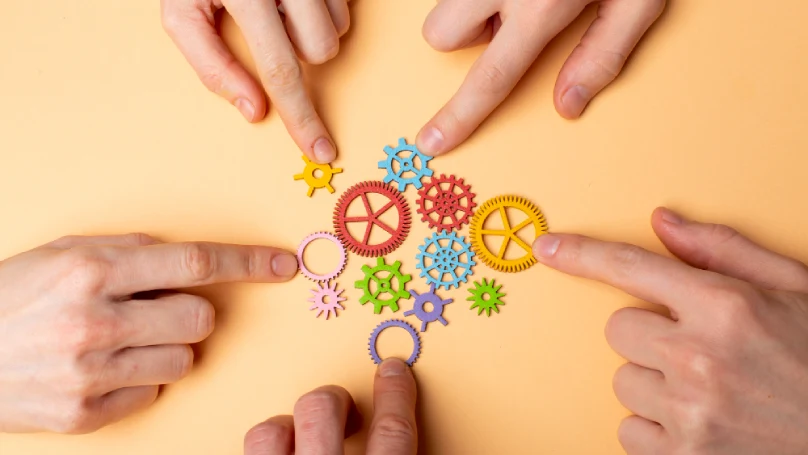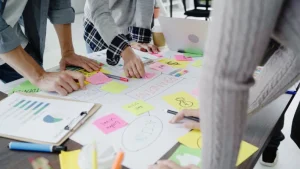Imagine entering a room where everyone accepts you immediately—their hearts are open to your suggestions, and they value your presence. Sounds like a fantasy, right? It is not magic, though; it is the effectiveness of soft skills. In today’s fast and hyper-competitive world, only technical skills matter. Employers are beginning to prioritize soft skills like communication, teamwork, and adaptability. Those skills keep teams glued together and winning.
And here is the killer point: soft skills are not something you are born with; they are learned, practiced, and perfected over time. Whether you are a beginner wading into your first job or a seasoned professional wanting to climb to the next level, this guide is about developing working soft skills. Ready to change the way that you connect, collaborate, and lead? Then let us go for it!
What Are Soft Skills and Why Do They Matter?
Soft skills are those personal traits that enable people to work together and cooperate in the workplace. Hard skills are technical skills, while soft skills include communication, adaptability, emotional intelligence, teamwork, and problem-solving.
These skills determine the kind of relationships people enjoy in the workplace and the degree of success they attain in a given field. Employers value soft skills because they create an enabling environment, foster positive cooperation and good decision-making, and enhance a company’s reputation. Strong soft skills can galvanize leadership potential, increase productivity, and enhance conflict resolution.
Professionals with excellent soft skills tend to adapt to workplace challenges quickly while nurturing strong professional relationships. A competitive market needs good soft skills as much as technical know-how. Therefore, developing soft skills guarantees a lifetime growth of career opportunities.
The Top Soft Skills You Need to Succeed
Soft skills essentially speak volumes about an employee’s success in a work environment. These skills include effective communication among employees, teamwork habits, and adapting well to change. Unlike technical skills, which teach specific tasks, soft skills prepare an individual to work with others during conflicts and build strong professional, interpersonal relationships.
Soft-skilled persons make great manpower resources because that is what usually gives life to the work context. They bring the possibility of increasing productivity over several degrees as follows: the better skilled the employee is, the less scope for misunderstanding through good communication skills, and clear-cut emotional intelligence is built for managing effective work dynamics.
Flexibility, adaptability, and creativity all help furnish persons with the courage to face any challenge thrown at them during their employment tenure and place them on a new path of change. All companies that seem to be targeting their premises and facilities to accommodate soft skills development live in an environment with an engaged workforce because, by finishing the skills in soft skills, employee turnover is reduced.
Soft skills are investment instruments that lead to promotion, assumed leadership, and competition with other industries. Continuous updating of these skills separates the market apart from ordinary professionals in the fast-changing job market.

Communication Skills: The Key to Effective Collaboration
Excellent communication is the linchpin of a productive workplace; without it, misunderstandings occur, teamwork goes awry, and goals remain unachieved. Most communication will be verbal transfer; however, action speaks louder than words.
Signals such as body posture, eye contact, distance, and touch build the message and establish trust. Active listening—recognizing and responding to colleagues’ input—brings another very significant aspect of communication into focus, for such acts strengthen the interpersonal layers in a workplace context. It’s proving a skill that involves providing feedback and receiving feedback that enables growth and equity among teams.
Concise and positive language can promote good understanding, while emotional intelligence would help in bringing smoothness to handling those difficult conversations. The development of communication skills takes much practice, including discussions, workshop attendance, and mentorship. These are then fine-tuned to promote conflict resolution, teamwork, and the general performance of the workplace. Thus, employees equipped with these tools become an organization’s great asset.
Emotional Intelligence: Understanding Yourself and Others
With emotional intelligence (EQ), a person can know and understand those feelings as well as all the emotions that one feels within oneself to use this knowledge and understanding for interfacing with others. Such a capability includes self-awareness, self-regulation, motivation, and empathy as part of social skills.
Having a high EQ is advantageous because it enables a person to form good relationships with colleagues in an office environment as well as relieve stress and communicate effectively. Self-awareness refers to knowing how these feelings and emotions affect others, while self-regulation refers to controlling instinct and action. Empathizing creates clarity about why collaboration and teamwork exist among colleagues.
Those social capabilities assist a professional in managing conflicts with great skills from which they can build strong relationships at work. Along with other ways, improving emotional intelligence requires practicing mindfulness, active listening, and learning from people’s feedback.
Employees who develop such characteristics become more important to organizations because it helps in mediation skills in dispute resolution along with allowing for effective and transformational approaches to leading people and creating an inspiring and engaging culture in the organization. All in all, improvement in terms of emotional intelligence makes a person very competent in terms of professional development and growth in career.

Teamwork and Collaboration: Working Well with Others
Most people attribute success to teamwork and collaborative efficiency. Trust refers to transparent communication that may involve compromises for getting work done effectively with other persons. It also accepts learning from other sources, where trust regarding teamwork implies dependability, listening actively, and mutual respect.
Such employees can contribute to better service delivery in the workplace and can even build an atmosphere in which workplaces are cheaper to maintain without conflicts, and hence be more productive. Conflict resolution is very important since it packs the kind of quality that keeps subtle disarray from breaking team office and members. Open-mindedness forms part of the skill set and brings morale up in the team as it allows calm questioning of issues allowing all to be benefited in hearing a solution.
Empathy is important in collaborative efficiency as it tends to understand different and other cores of work within a border in decision making such as talking about the issue.
The diversity of the approaches and the use of strengths possessed by all the members of the team will result in a better process in making decisions.
Thus, these will put into practice valuable contributions toward advancement for the individual in collaboration. Healthy collaboration in the workplace, innovative practices from many influences, and thrice cohesive teams would profess the extensive gradual improvement of one professionally.
Adaptability and Problem-Solving: Thriving in a Dynamic Workplace
Adaptability and good problem-solving abilities lead to success in today’s fast-paced work environment. The ability to adjust to change, to learn fast, and to change strategies and change back as required are all important skills of adaptability. Employees who accept change will be more resilient and will proactively reduce the impact of change, thereby allowing for continual growth.
Problem-solving involves critical analysis, creative generation of alternative solutions, selection, and implementation of the most effective. People with strong decision-making skills and a solution-oriented attitude take challenges in stride to maximize their efficiency in getting a job done.
To increase your adaptability, practice remaining calm under pressure, look for opportunities to learn, and keep your approach flexible.
Consciously putting multiple brainstorming techniques into use, to obtain maximum experience, actually grows one’s problem-solving ability. Employees instill in organizations the confidence to tackle any challenge ahead and are therefore their most valuable asset to any continuous improvement program.

Time Management and Organization: Maximizing Productivity
Among the indispensable skills with which one ought to work efficiently is the management of time alongside organization. It denotes the fact that the professional is supposed to learn how to prioritize tasks, sift through goals, and eliminate distractions-respectively, to concentrate on his work and meet deadlines.
Diversions keep work from getting done; therefore, attention and execution can be maximized by applying the Pomodoro, Eisenhower Matrix, or time-blocking techniques. Another important factor in proper organizing is using technologies, planners, as well as to-do lists, leading to a timely workflow with less stress.
Time management helps establish the balance between workloads, freeing up time to develop work quality and reduce burnout. Incorporating time management is essential for any would-be creative person in any field.
Explore more about these practical strategies in our article on time management for creative people. Applying these skills over time leads to getting things done faster, better, and with consideration for maintaining a healthy work-life balance.
in closing
It can take a long time for anybody to develop soft skills, and a good bit of effort goes into it too, but the rewards are tremendous. Strong communication, emotional intelligence, and adaptability will always make you a powerful asset to any company. These improve collaboration and productivity and eventually problem-solving abilities.
You can improve your interpersonal skills through continued active listening, developing empathetic understanding, and inviting feedback while continually improving one’s ability and flexibility to work in a different environment.
One good way to teach the student about leadership and communication potential is through investment in learning leadership techniques.
Find out how to learn leadership skills on our guide for their substance. Growth is something that needs to go on and on instead of lifelong commitments to learn, feedback, and application of such practices every night. The more you practice, the more prepared and confident you will become in professional dealings.











